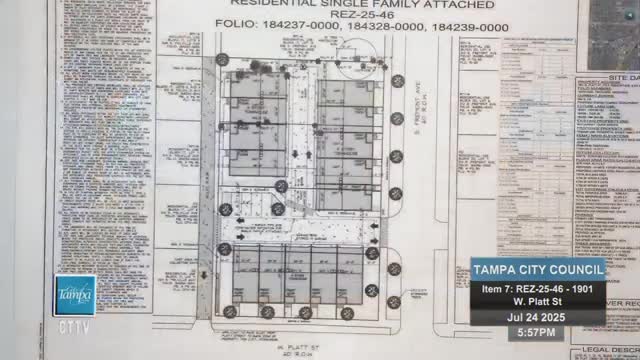Tampa Planning Commission reviews Platt Street residential development for compliance with design standards
July 25, 2025 | Tampa, Hillsborough County, Florida
This article was created by AI summarizing key points discussed. AI makes mistakes, so for full details and context, please refer to the video of the full meeting. Please report any errors so we can fix them. Report an error »

In a recent Tampa City Council meeting, significant discussions centered around a proposed residential development on West Platt Street and South Fremont Avenue. The project, which seeks to rezone the area from commercial and multifamily classifications to a plan development for single-family attached homes, has sparked a debate regarding its design and compatibility with the surrounding neighborhood.
City staff reviewed the application and found it generally consistent with city planning goals. However, concerns were raised about the proposed height and massing of the structures, which reach up to 45 feet or four stories. Staff noted that this scale is out of character with the existing development pattern in the area, which predominantly features lower buildings. Despite these concerns, the council expressed a willingness to consider modifications to the site plan to address these issues before the second reading of the proposal.
The Planning Commission highlighted that while the comprehensive plan supports increased housing supply, it emphasizes the importance of context-sensitive design. The proposed site plan was criticized for not aligning with key design principles that promote pedestrian-oriented development. Specifically, the design lacks adequate pedestrian access and does not integrate well with the street frontages, which is essential for fostering a walkable community.
During the meeting, the project's architect defended the design, arguing that it fits well within the busy corridor of Platt Street, which is already home to various multifamily and commercial developments. He emphasized the project's attractive features, including a rooftop garden and balconies, which aim to enhance outdoor living spaces for residents.
Council members expressed mixed feelings about the height of the buildings, with some supporting the design as a positive addition to the neighborhood. They acknowledged the need for careful consideration of pedestrian access and landscaping, particularly regarding tree planting and the overall aesthetic of the development.
The council ultimately voted unanimously to move forward with the first reading of the rezoning ordinance, which includes stipulations to modify the site data table and ensure that the proposed elevations are binding. A second reading is scheduled for August 28, 2025, where further discussions and potential adjustments to the project will take place.
This meeting underscores the ongoing challenge of balancing development needs with community character in Tampa, as the city continues to navigate the complexities of urban growth and planning.
City staff reviewed the application and found it generally consistent with city planning goals. However, concerns were raised about the proposed height and massing of the structures, which reach up to 45 feet or four stories. Staff noted that this scale is out of character with the existing development pattern in the area, which predominantly features lower buildings. Despite these concerns, the council expressed a willingness to consider modifications to the site plan to address these issues before the second reading of the proposal.
The Planning Commission highlighted that while the comprehensive plan supports increased housing supply, it emphasizes the importance of context-sensitive design. The proposed site plan was criticized for not aligning with key design principles that promote pedestrian-oriented development. Specifically, the design lacks adequate pedestrian access and does not integrate well with the street frontages, which is essential for fostering a walkable community.
During the meeting, the project's architect defended the design, arguing that it fits well within the busy corridor of Platt Street, which is already home to various multifamily and commercial developments. He emphasized the project's attractive features, including a rooftop garden and balconies, which aim to enhance outdoor living spaces for residents.
Council members expressed mixed feelings about the height of the buildings, with some supporting the design as a positive addition to the neighborhood. They acknowledged the need for careful consideration of pedestrian access and landscaping, particularly regarding tree planting and the overall aesthetic of the development.
The council ultimately voted unanimously to move forward with the first reading of the rezoning ordinance, which includes stipulations to modify the site data table and ensure that the proposed elevations are binding. A second reading is scheduled for August 28, 2025, where further discussions and potential adjustments to the project will take place.
This meeting underscores the ongoing challenge of balancing development needs with community character in Tampa, as the city continues to navigate the complexities of urban growth and planning.
View full meeting
This article is based on a recent meeting—watch the full video and explore the complete transcript for deeper insights into the discussion.
View full meeting